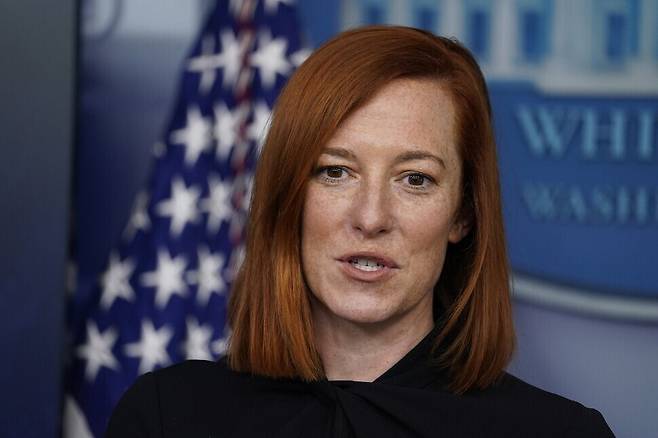[Reporter's notebook] Korean conservatives' overreaction to the White House's "new strategy" on N. Korea
전체 맥락을 이해하기 위해서는 본문 보기를 권장합니다.
After confirming that the reporter's second question is about "US policy on Japan as it relates to North Korea," Psaki began by noting that North Korea's ballistic missiles "constitute a serious threat."
"We will adopt a new strategy to keep the American people and our allies safe," Psaki continued, explaining that "a thorough policy review" would involve "close consultation with South Korea [and] Japan."
이 글자크기로 변경됩니다.
(예시) 가장 빠른 뉴스가 있고 다양한 정보, 쌍방향 소통이 숨쉬는 다음뉴스를 만나보세요. 다음뉴스는 국내외 주요이슈와 실시간 속보, 문화생활 및 다양한 분야의 뉴스를 입체적으로 전달하고 있습니다.

I sometimes get the feeling that newspaper columnists who write about foreign policy and national security are given too much latitude. While there are relatively clear consequences for inaccurate reporting on domestic issues, government officials often decline to correct obviously inaccurate reports about foreign policy and national security, given the emphasis on secrecy.
These tendencies become even more pronounced when interpreting the foreign policies and national security policies of other countries, with various pundits frequently offering the exact opposite reading of the same text. Since the American and Japanese governments aren’t about to make protest calls over Korean reporters’ arbitrary interpretations, the parade of untethered analysis goes on and on.
This impression was reinforced by the interpretations offered by conservative newspapers on Jan. 25 of the “new strategy” mentioned by White House Press Secretary Jen Psaki in a Jan. 22.
In an editorial, the Dong-a Ilbo noted that this was “the first time” that the Biden administration has mentioned a new strategy toward North Korea. “This formalizes the Biden administration’s campaign to eradicate Trump’s policies, including its policy on North Korea,” the Dong-a Ilbo concluded.
The Chosun Ilbo made a similar argument, declaring that “the Biden administration has clarified its position on North Korea just two days after its launch” and insisting on the need for South Korean President Moon Jae-in and the US to “be on the same page about the threat of North Korea’s nuclear program.” In short, the Chosun Ilbo argued, the Moon administration is deluding itself while the US scraps Trump’s policy toward North Korea and drafts a new strategy.
But do Psaki’s remarks really merit such a shrill response? The press briefing can be viewed in a video (which runs for 61 minutes and 42 seconds) on the White House’s YouTube channel. The remarks in question came when Psaki responded to a question toward the end of the briefing.
A Japanese reporter who was sitting toward the back of the briefing room first asked for the White House’s stance on holding the Tokyo Olympics this summer and then shifted topics to the Biden administration’s Indo-Pacific policy.
After confirming that the reporter’s second question is about “US policy on Japan as it relates to North Korea,” Psaki began by noting that North Korea’s ballistic missiles “constitute a serious threat.”
“We will adopt a new strategy to keep the American people and our allies safe,” Psaki continued, explaining that “a thorough policy review” would involve “close consultation with South Korea [and] Japan.”
In fact, Psaki was simply rephrasing what Antony Blinken, Biden’s nominee for secretary of state, said during his Senate confirmation hearing on Jan. 19.
“We intend to review the entire approach and policy toward North Korea,” Blinken said. “That starts with consulting closely [. . .] with South Korea and with Japan and others and reviewing all of the [options].”
Blinken also said that the US would “look at what options [. . .] can be effective in terms of increasing pressure on North Korea to come to the negotiating table as well as what other diplomatic initiatives may be possible.”
The US’ policy review is supposed to lead to a “new strategy,” and probably not a recapitulation of “old strategies” that have failed.
South Korea and the US are expected to face some friction as they coordinate their respective policies, but the fact is that neither side has a surefire solution to the challenging riddle of the North Korean nuclear issue.
It’s fine to make an argument and present the facts, but there’s no reason to get excited about the phrase “a new strategy.”
By Gil Yun-hyung, staff reporter
Please direct comments or questions to [english@hani.co.kr]
Copyright © 한겨레. 무단전재 및 재배포 금지.